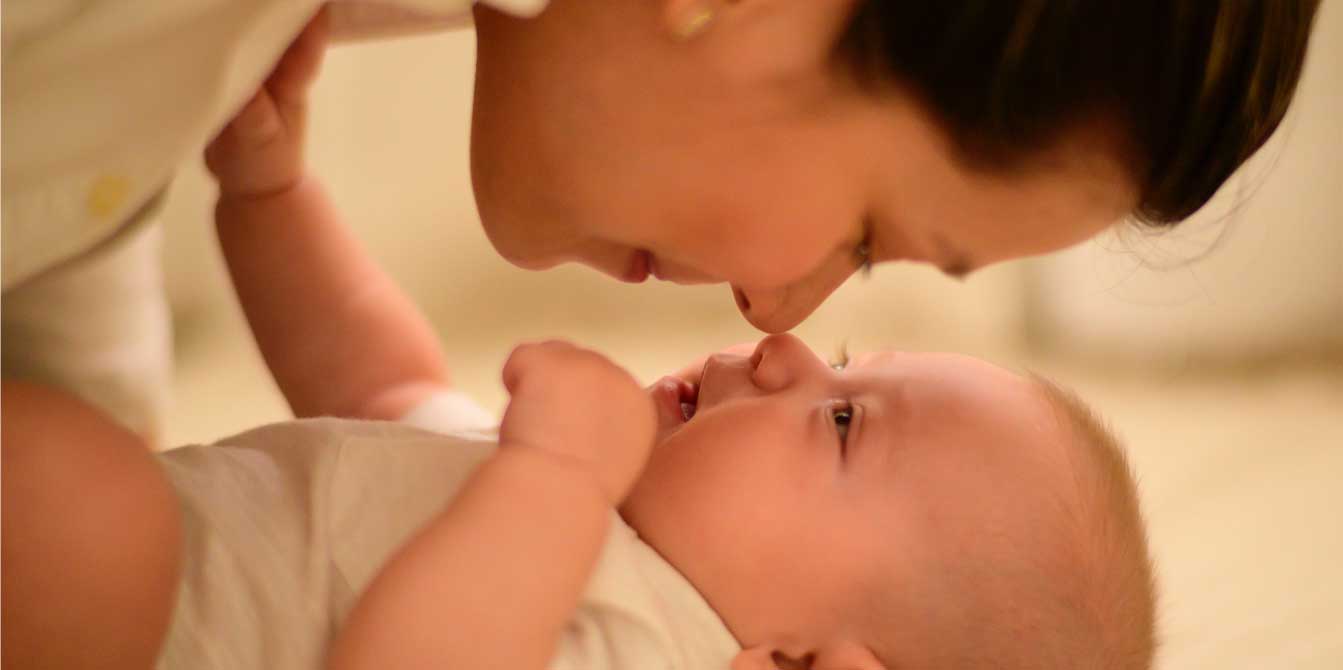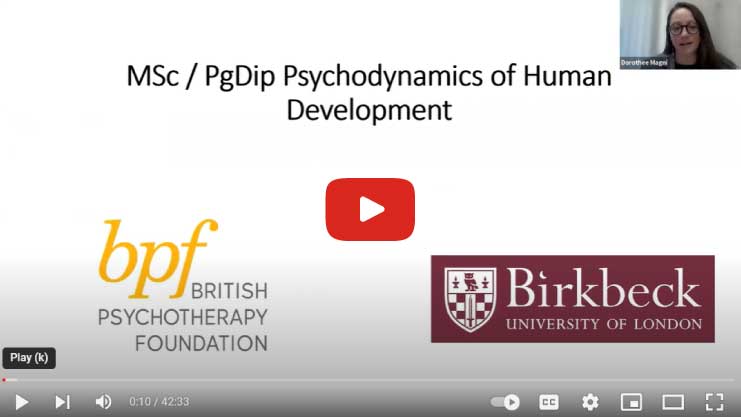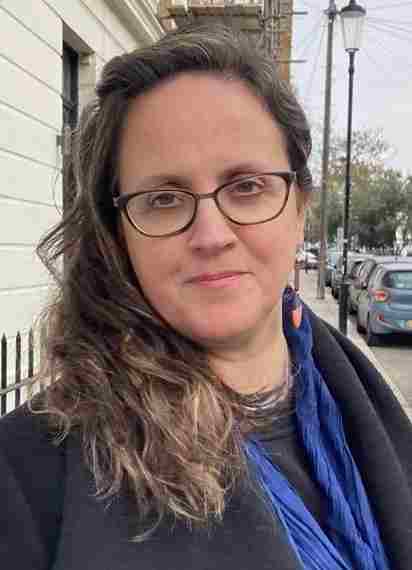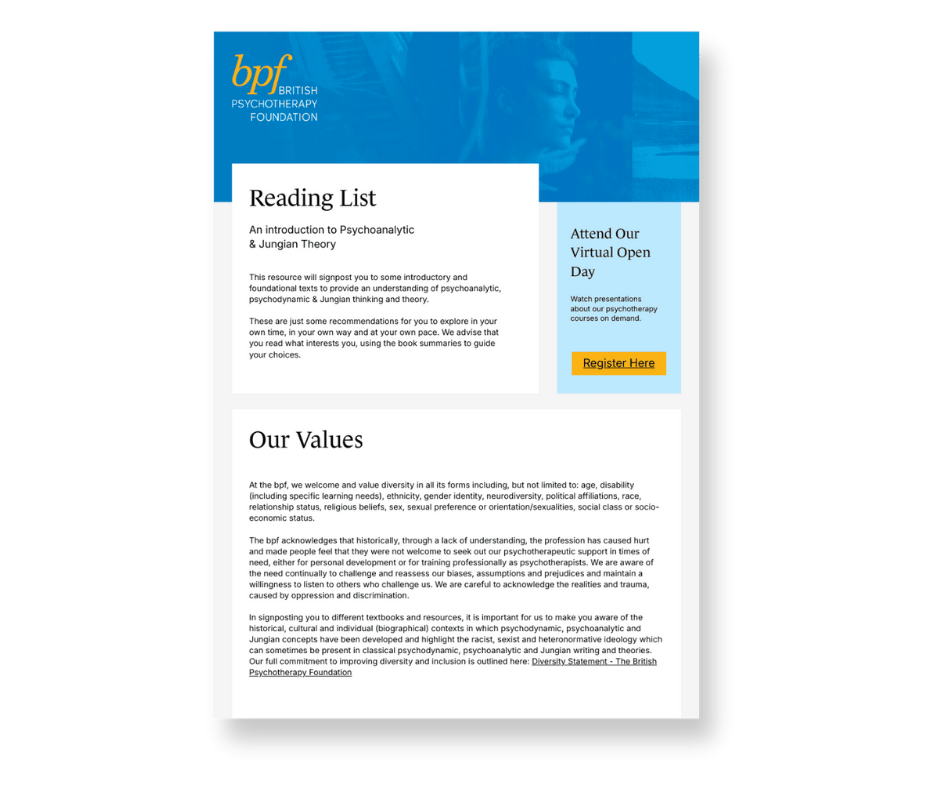
MSc Psychodynamics of Human Development
Training Location: In London or Online.
Part-time course. Course length: 2 years. Wednesday evenings 5-10pm.
Our MSc provides an understanding of human development through a set of theoretical and experiential modules. This pre-clinical course is designed to prepare students for a career in psychotherapy. It is a foundation course that offers an accredited infant observation, and it fulfils the entry requirements for a Child and Adolescent Psychotherapy Doctorate.
Please contact the MSc Course Coordinator for further information: [email protected]
Application for 25/26 is now closed
Applications for 20/27 now open via the Birkbeck website.
Please note we encourage submissions up to June after which we may not be able to guarantee a place will be available
- Who is it for?
- Course Content
- Entry requirements
- Online Delivery
- How to apply
- Course fees
- Resources
- Training Pathways
- FAQs
- Meet the Team
This course is tailored for individuals curious about psychotherapy, offering an enriching blend of academic and experiential seminars. This program is a gateway to professional and personal growth, fostering holistic development. It caters to professionals from diverse settings, including community care, counselling, social services, primary care, mental health, education, and any other background.
The two-year part-time MSc prepares students for a career in psychotherapy with adults or children:
Child and Adolescent Psychotherapy
The course is open to students living in the UK for the duration of the course.
Our psychodynamics of human development course provides an understanding of human development through 4 distinct modules over two years:
A two-year Infant Observation, following an established practice for learning about the psychodynamics of human development through detailed weekly observation of an infant from birth and weekly discussion seminars in a small group with a trained psychotherapist.
Weekly Work Discussion seminars, where students take turn to present an observation of a work setting. The small group led by an experienced psychotherapist focuses on the personal and interpersonal responses and organisational dynamics. Work discussion includes contemporary Jungian concept of the cultural complex and the work of W. Bion and M. Klein.
The Dissertation module includes taught seminars on research methods leading to a research project with a Jungian Analytic or Psychoanalytic lens on contemporary topics of the student’s choice.
Recent research topics include: how teachers understand children’s aggression; the appeal of computer gaming for adult men; post-natal depression in British-Chinese mothers; the impact on feelings of identity in adults raised in a religious cult; the emotional impact of growing up in a boarding school; the experience of palliative care workers in working with the dying; individuation and early retirement; contemporary views on the animus; midlife in the workplace; homeopathy and sickness as symbol; the sense of Self in male to female transsexuals; Jungian perspectives on work with adolescents; spirituality and individuation; the feminine in the cultural unconscious
Weekly theory seminars to explore the life cycle with a choice of Jungian Analytic or Psychoanalytic approach:
Psychoanalytic approach
- An introduction to selected core concepts of psychoanalytic thought from the work of Freud, Klein and Winnicott
- Pregnancy and the origins of the relationship between the mother and her baby. The development of the infant as a social human being
- The emotional, social, cognitive and perceptual and especially communicative skills and attributes of the baby’s development as it becomes a toddler
- Adolescence and young adulthood and the of core tasks of adult life – the capacity for intimate relationships and establishing a family
- Contemporary thought on gender, sexuality, racism, politics and the environment
- An examination of how strains and stresses experienced in development impact on adult life
OR
Jungian analytic approach
- Jungian model of the psyche: the self, individuation, collective unconscious, archetypes, transcendent function, symbol formation and dreams
- Jungian baby and child: Fordham’s development of Jungian concepts and psychoanalytic theories of Klein, Bion and Winnicott
- Jungian life cycle: the unfolding of the self in individuation through developmental stages and archetypal contexts including adolescence, mid-life, old age and death
- Contemporary Jungian thought: gender, sexuality, racism, spirituality, neuroscience, synchronicity, culture and collective experience
- Link to Jungian Terms Explained – Helen Morgan and Christopher McKenna’s clear glossary of some Jungian terms
Our standard postgraduate entry requirement is a second-class honours degree (2:2 or above) from a UK university, or an equivalent international qualification. It is also helpful to have work experience post any undergraduate study. In some circumstances non-graduates with academic and professional experience may be considered. Experience of working with children, adults or families is an advantage.
International students
Students on the course are required to live and work in the UK for the duration of the course.
Other requirements
Students are required have or apply for a full enhanced DBS, including the update service after enrolment.
For online students
All online students are required to come to London once a term for a study day (10-8pm).
Access to a computer and a stable internet are essential. Academic / Personal references will be requested as part of the application process.
For students unable to travel to London weekly, the MSc will prioritise offers to study online to those residing outside of London.
Online seminars run concurrently to the seminars taking place in London, on Wednesdays 5-10pm.
All online students are required to come to London once a term for a Study Day, 10am-8pm.
We ask students joining online to always:
Keep their camara on
Actively take part in discussions. Seminars are never recorded.
To respect issues of confidentiality and be alone in a room when taking part to seminars
It is essential to have access to a computer and a stable internet connection.
If you are thinking about joining the course online, please consider the following:
How important is it to you to be in a room with others to learn and generate new ideas? (What is your learning style?)
What strategies might you put in place to create opportunities for exchange with your peers? (reaching out and learning together)
Can you make space to study – physical and mental space? What kind of support do you have in place? (Self-care)
Apply now to secure a place in London or online: visit the Birkbeck University website below.
We will review every postgraduate application to bpf/Birkbeck on its individual merits. Your professional qualifications and/or relevant work experience will be taken into consideration positively. We actively support and encourage applications from mature learners. On your application form, please list all your relevant qualifications and experience, including those you expect to achieve. You do not need to have completed your current qualification to start your application.
As part of the application process, you will be requested to attend an interview in person and at the bpf premises with the bpf Course Director or an experienced course tutor and to provide a reference.
The bpf is committed to diversity and inclusivity in all the work we deliver. We are fully dedicated to promoting, maintaining and supporting equality of opportunity in all aspects of our organisation and, as such, the bpf welcomes applications from all sections of society.
Closing date:
It is recommended that you apply by June. We do accept late applications, but we cannot guarantee a place will be available.
Please see the course page on the Birkbeck University website for the current fees.
Postgraduate loans
Government loans are available for postgraduate studies, allowing you to borrow most of the cost of your master’s degree (MA, MSc, LLM, MRes). These loans are not means-tested – i.e. they are not linked to household earnings, savings or investments – and are available for those who have not previously completed a master’s degree. For more information please visit: http://www.bbk.ac.uk/student-services/financial-support/postgraduate-loans
MSc students completing the course as part of the preclinical requirements for the child & adolescent psychotherapy training may apply to a Health Education England bursary offered to improve equity of access and inclusion for Black, Asian and minority ethnic entrants and financially disadvantaged candidates to child and adolescent psychotherapy training.
As part of the application process, students are requested to evidence their experience of working with children and their commitment to the psychotherapy profession.
Applications for the HEE Bursary open in January for first year students; submission in March and interview with a panel in April, yearly.
Recipients of a bursary are not guaranteed a place on the Child and Adolescent Doctorate.
Course dates year 1 and year 2
Attend our Virtual Open Day to watch a presentation about this course.

The MSc fulfils the entry requirements for the BPF Child and Adolescent Psychotherapy Doctorate.
After completing this course, students can also apply to join one of our other qualifying adult trainings. We recommend that MSc students wishing to apply to a psychotherapy training to work with adults complete the Clinical Module of the Foundation Course and gain clinical experience.
Cost for this module is reduced for MSc students.
The MSc acts as a foundation for Psychodynamic Psychotherapy.
What kind of help does the course provide to find a baby to observe?
Students are supported throughout their search for a baby and their observation with weekly group discussions. Students and tutors think together about the meaning of the observation and the potential difficulties in finding a willing family. Practical help in the form of leaflets / letter is also available.
I live in London, and I would like to study online.
The number of places on the course is limited. Priority will be given to those who live outside of London.
Do I have to be in therapy for the duration of this course?
No, it isn’t compulsory to be in therapy whilst studying on this course. However, it is strongly recommended that you are in therapy for the duration of your observation of an infant. Therapy guidelines are provided.
Can I apply to the Jungian stream and have a chance to be accepted to the Child and Adolescent Psychotherapy Doctorate? Or do I have to choose the Psychoanalytic stream?
Both streams are accepted by the ACP and by training schools. Students from both streams have been accepted in training schools across the UK.
I would like to train as an adult psychotherapist after this course. Will my infant observation be valid?
Yes.
When planning for clinical training, it is important to check all the requirements, to attend open days and to talk to tutors on the course.
I need to complete 2 full years of observation. What happens if I find a family to observe after the first winter break?
Additional supervision is offered to students who wish to continue with their observation beyond the end of the course to complete 2 full years.
Please note there is a small cost for this.
Can I switch between the online delivery of the course and the in-person classes?
No, it is not possible to switch from one mode of delivery to the other. Ad hoc online attendance at an otherwise in person seminar is also not accepted.
I live in Europe; can I join the course online?
Unfortunately, this course is only open to students residing in the UK.
I would like to become a child and adolescent psychotherapist. What is the most important module on the course to help me be accepted for the doctorate?
The overall quality of your engagement to each module is important to gain good foundations to train. Each module provides a certain kind of learning that is helpful for your own development as well as for an application to a training.
Please note
Students with a previous MA/MSc and students having achieved a 2:1 or above in their first degree can apply to IPCAPA with the PgDip (no dissertation).
Fees for PgDip and MSc are the same in the first year. We recommend that candidates apply for the MSc and decide towards the end of the 1st year whether to opt out of the dissertation module.
Students existing at the end of the first year, can graduate with a Post Graduate Certificate. The PG Cert is not enough to apply to the Child and Adolescent Psychotherapy training.
Students must complete two full years of Infant Observation.



We welcome email enquiries at: [email protected]

New Courses
- Awakening the Inner World: An Experiential Weekend for Beginners – (Taught in London, 5th–6th & 26th–27th September, 2026)
- Intensive Summer School: Foundations of Psychoanalytic & Jungian Psychotherapy – (Taught Online, Thursday 16th to Monday 20th July, 2026)
- Reading Group – Psychoanalytic Psychotherapy Association – (Taught Online, Rolling Entry)
- Psychodynamic and Jungian Theory for Qualified Practitioners (Taught Online, September 2026)
bpf North:
- Foundation Course (Taught in Newcastle, October 2026)
- Psychoanalytic & Psychodynamic Psychotherapy Training (Taught in Newcastle & Online, October 2026)
Upcoming Events:
- 31st January, 2026 – Barbara Dockar-Drysdale One-Day Conference (Public Registration Page) – Time: 10:00 – 14:45. Venue: Hybrid event – BPF Mapesbury Rd & Online via Zoom. Price: Public admission fee (In Person) £35, Public admission fee (Online) £25.

Make a £10 Donation – Receive a Psychoanalytic Reading List
Donating supports our mission to make our psychotherapy training, clinical services, and public events affordable, accessible, and more inclusive.
Reading List: Introduction to Psychoanalytic & Jungian Theory
Receive a curated list of 67 essential texts – covering psychoanalytic, psychodynamic, and Jungian theory – ideal for both newcomers and those wanting to deepen their knowledge.
